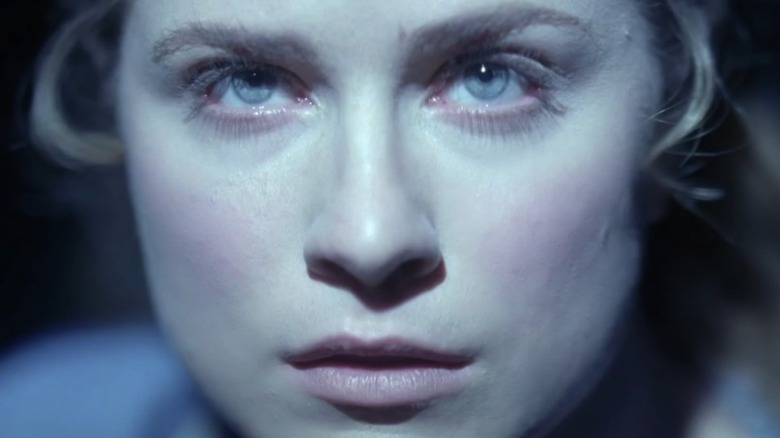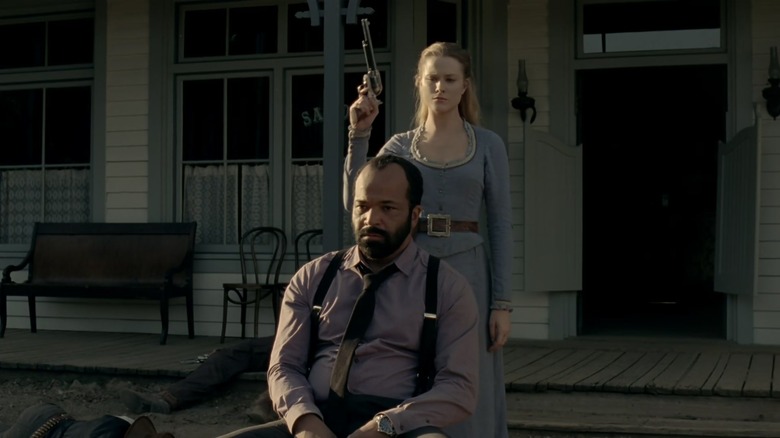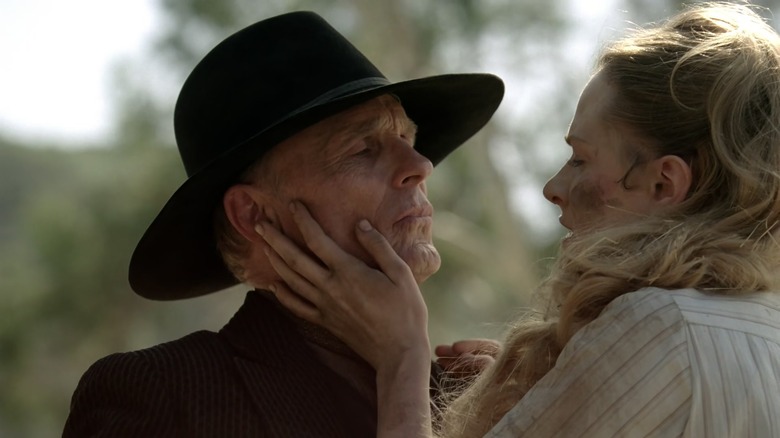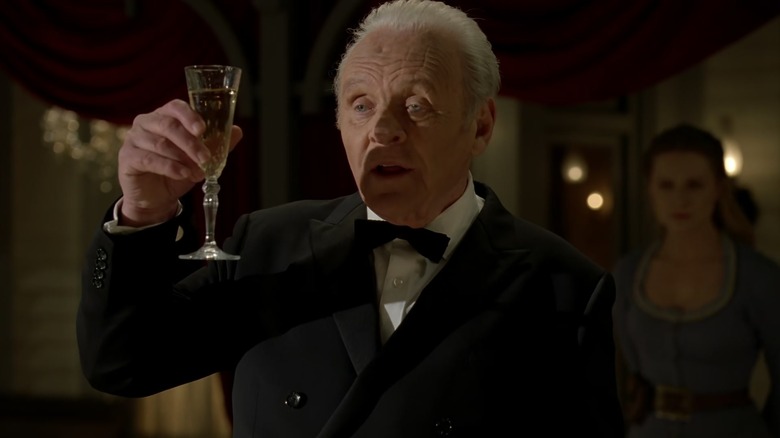The Ending Of Westworld Season 1 Explained
The year was 2016, and winter was coming to the offices of HBO. "Game of Thrones" was running out of source material thanks to George R. R. Martin's eight-words-per-minute typing speed. A new franchise was in order, preferably at the same scale in terms of epic, sweeping settings, but ideally with fewer CGI wolves — "CATS" was still three years out, so the art of digital fur technology hadn't yet been developed into a flawless science.
And so it was that "Westworld" was born, a breathtaking reimagining of the universe first introduced in Michael Crichton's 1973 motion picture of the same name. The lines between sci-fi and reality had blurred since the concept's origin, and new questions were ready to be asked. The idea of killer robots was swiftly becoming more fact than fiction while the guilt of untold Bethesda NPCs cut down in their prime and YouTube videos of Furbies being placed in microwaves had society pondering "what if man is the real killer robot after all?"
In its debut season, HBO's "Westworld" takes audiences to a futuristic amusement park for the super wealthy. Here, android Hosts, externally indistinguishable from human beings, are treated like living open-world video game characters, used by guests in the market for some decidedly violent delights. Half of the fun comes from the Hosts' immensely realistic reactions, made possible by the designs of park founder Dr. Robert Ford and his late business partner, Arnold. The Hosts' minds are entirely malleable, able to be wiped and reprogrammed by the park's team of specialists with a few swipes of an app, all of which makes it more than a little confusing when, without any obvious reason, a few of the machines start to get some funny ideas about things like Shakespeare quotes and how much milk is too much milk.
Westworld's violent delights have violent beginnings
Typical of any production involving a Nolan that doesn't include Batman, it's hard to know exactly where to start when describing the plot of "Westworld." It's like the whole thing is some sort of a maze or something.
Deconstructed, "Westworld" begins with a pair of obsessed gentlemen, Robert Ford and Arnold Weber. The two set out to create the eponymous park, with Ford attempting to design Hosts with a facsimile of intellect while Weber tried to create the real thing. Weber's obsession becomes full-blown after the death of his son, Charlie. Shortly before the park opens, Weber achieves his goal, creating — depending on where you got your philosophy major — true artificial consciousness.
Realizing that putting his newly created Hosts into the park would doom them to decades of pain, Weber programs his prize robot, Dolores, to slaughter her fellow machines and, more importantly, Weber himself. The hope is that this bloodsoaked hiccup will stop Ford from opening Westworld. Clearly Weber never read a Michael Crichton book before. You've got to wake up pretty early in the morning to make sure that one of his murder parks doesn't open on time.
Westworld grows and changes, just not in a linear fashion
Time passes. One of the park's investors, Logan Delos, takes his soon-to-be brother-in-law to Westworld, where said brother-in-law, William, falls very much in love with Dolores. Logan, Dolores, and William zig-zag across one another's hero's journeys, with William believing that the Hosts are more than the sum of their parts and Logan believing that it's fun to shoot robots. Meanwhile, Dolores is haunted by confused memories of a man telling her about a Maze that she has to reach the end of. That's important later on.
At the end of their adventure, William's aw-shucks attitude gets traded in for cynicism when Dolores has her memory of their time together erased. William becomes the new heir apparent to Logan's family fortune, and Logan gets a deeply personal understanding of how badly horse hair can chafe. Dolores, despite the memory wipe, continues to experience tete-a-tetes with that guy who loves mazes so much.
Years fall off the calendar. The park continues to develop. Ford, and this is important, creates a perfect copy of his old business partner in Host form, changing his name to Bernard but leaving key memories like the death of his son in order to provide an emotional touchstone. William walks the long road from looking like Jimmi Simpson to looking like Ed Harris, returning to the park for regular visits in which he releases the pent-up negative energy by attacking Dolores, gunning down bandits, and searching for that Maze that he heard so much about.
Ford's farewell caps off a season of Westworld
Older and more in step with his late partner's way of thinking concerning the sentience of the Hosts, Ford activates a series of codes designed by Arnold called "Reveries." These allow the hosts to pull shadows of memories from their previous builds, bringing them one step closer to consciousness.
Dolores gets the worst of this, snapping back and forth between the present and her memories of her time with William. She comes to realize that the Maze she's been haunted by was a metaphor for her own consciousness. William isn't wild about that theory and stabs her in the gut.
After being repaired by Ford, Dolores learns about more of her past and is given the pistol that she used to kill Arnold 35 years prior. Ford addresses a retinue of guests and investors with a speech on the importance of stories, and gets everyone psyched for a brand new one, just before being shot by Dolores. A swarm of retired Hosts descends on the part, shambling like the undead, and a previously unenthusiastic William gets positively giddy after being shot in the arm. What will follow is uncertain, but chaos seems unavoidable.
Shoot, also: There's a Host named Maeve who responds to the Reveries by remembering that she used to have a daughter, and she gives up a chance to leave the park so that she can go and find her kid. That'll probably be important in the next season.



